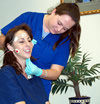Our Facility
|
Our Staff
|
Diagnostic Studies
|
DIAGNOSTIC STUDIES WE PERFORM: ( A referral is required for all diagnostic studies)
- NPSG (Nocturnal Polysomnogram) 95810: This is an all night observational study of the patient’s sleep patterns. The Polysomnogram consist of continuous monitoring of central and occipital electroencephalograms, submental and anterior tibialis electromyograms, and measures of thoracic and abdominal ventilatory effort. Nasal and oral airflow are by thermocouples, and SpO2 levels by pulse oximetry. This study helps to determine if you have a sleeping disorder.
- NPSG w/ CPAP Titration (Nocturnal Polysomnogram with Continuous Positive Airway pressure) 95811: this is an all night treatment for patients who have already been diagnosed with sleep apnea. The use of airway pneumatic splinting (CPAP) will treat sleep apnea and snoring. The patient’s airway will be held open with pressurized, filtered air to correct for the diagnosis of sleep apnea.
- MSLT ( Multiple Sleep Latency Test) 95805: This study is used for hypersomnolence and must be preceded by an NPSG study. It documents how clinically sleepy a patient is. It is also used to test for Narcolepsy.
- MWT (Maintenance Wakefulness Test) 95805: This test provides information on the patient’s ability to maintain wakefulness during specific portions of the day or night. The patient is required to sit comfortably in a chair for 40 minutes under permissible situations and try to maintain wakefulness. (Four trials, forty minutes each, every two hours). This test usually follows a NPSG or NPSG w/CPAP to verify the patient has adequately slept the night before. The doctor must specify whether a NPSG is to be performed the night before the MWT. This is the current test available for release back into work for Truck Drivers, Bus Drivers, and Airline Pilots.
- NPSG w/Bi Level Pap (Nocturnal Polysomnogram with Bi Level Positive Airway Pressure) 95811:
This is an all night treatment for sleep apnea using CPAP and different positive airway pressures for spontaneous inhalation and exhalation. Used for treatment of hypoventilation. Usually this method is used if CPAP has failed. -
Bi Level Auto SV Pap: (Nocturnal Polysomnogram with Servo Ventilation) 95811: This is designed for patients who have mixed apneas, complex apneas, periodic breathing or central apneas. It provides three types of support. 1. Auto-titrating CPAP or Bi-level PAP to prevent airway collapse during OSA events. 2. Automatically calculated back-up rate for central apneas, and 3. Pressure support ventilation during periods of hypoventilation.
-
PAP NAP: (A daytime, abbreviated Cardio-Respiratory Sleep Study) 95807: This is performed during the day to help acclimate insomnia patients with Sleep Disordered Breathing to Positive Airway Pressure.
-
HST: (Home Sleep Testing) 95806: This study helps to determine if you have a sleeping disorder and is performed at the patient’s home.
- *** We are able to perform sleep studies on children 5 years old and up. The CPT code for 5 year olds are as follow: Polysomnogram younger than 6 years: CPT code 95782. CPAP Titration younger than 6 years: CPT code 95783.
 The Pensacola Sleep Disorder Center is an independent testing facility that has been assisting physicians in the diagnosis of sleep related disorders since 2003. We are a six-bed lab that performs sleep studies seven nights a week. Day studies are also available for those who qualify. Each room is private, with a double sized bed, floor fan, and cable TV. Upon request, we can provide a recliner for the patient or the patient’s care giver.
The Pensacola Sleep Disorder Center is an independent testing facility that has been assisting physicians in the diagnosis of sleep related disorders since 2003. We are a six-bed lab that performs sleep studies seven nights a week. Day studies are also available for those who qualify. Each room is private, with a double sized bed, floor fan, and cable TV. Upon request, we can provide a recliner for the patient or the patient’s care giver. Our Polysomnographic Technologists are experienced, skilled,and certified to provide your physician accurate and precise test results on your study. Our reading physicians (who bill separately for the reading of these studies) are Board Certified in the diagnosis and treatment of sleep related disorders (ie; Sleep Medicine).
Our Polysomnographic Technologists are experienced, skilled,and certified to provide your physician accurate and precise test results on your study. Our reading physicians (who bill separately for the reading of these studies) are Board Certified in the diagnosis and treatment of sleep related disorders (ie; Sleep Medicine). Diagnostic Studies are provided by professional referral only. If you have symptoms of sleep disorders, contact your physician and ask them how the Pensacola Sleep Disorders Center can help you.
Diagnostic Studies are provided by professional referral only. If you have symptoms of sleep disorders, contact your physician and ask them how the Pensacola Sleep Disorders Center can help you.